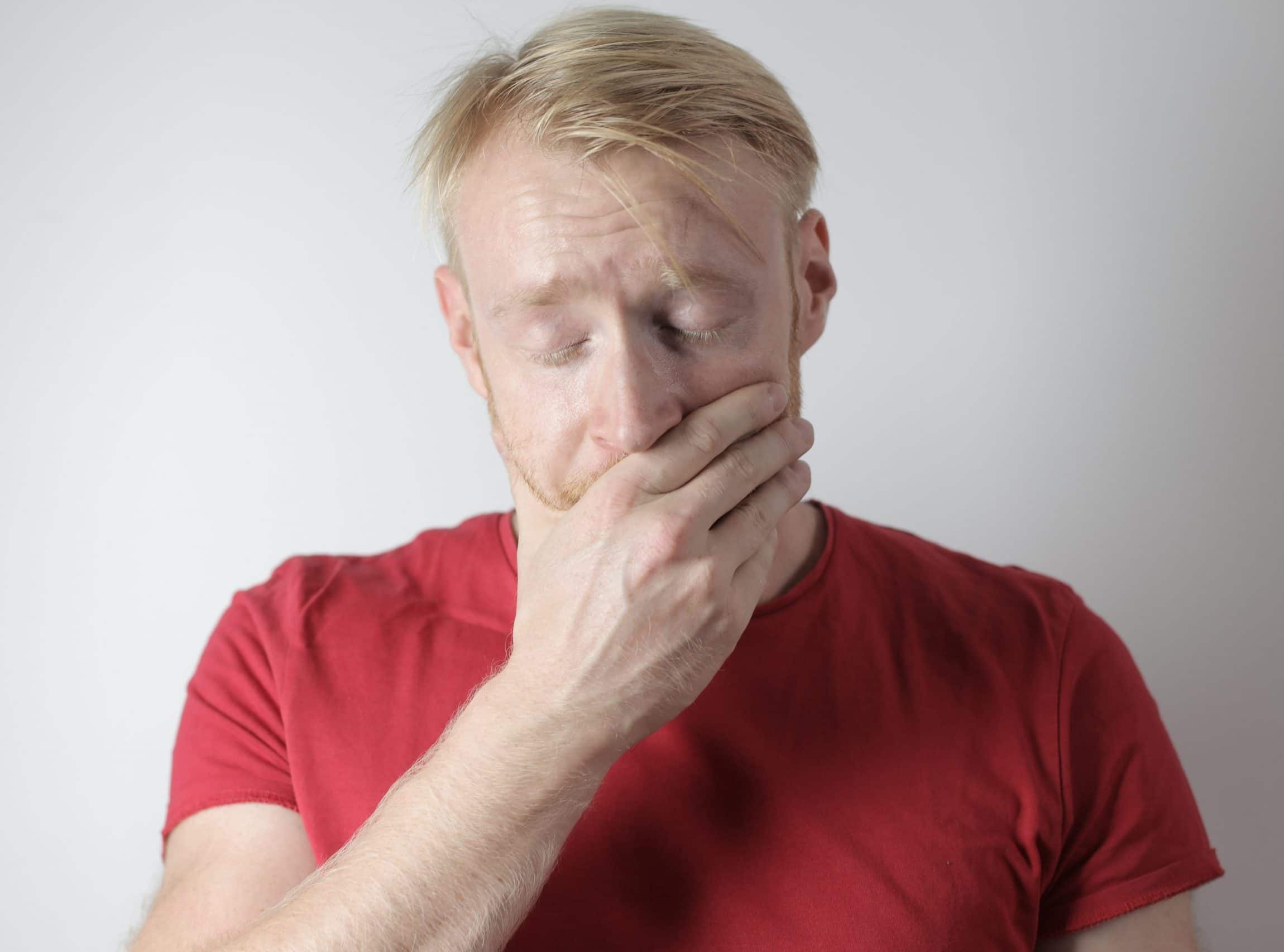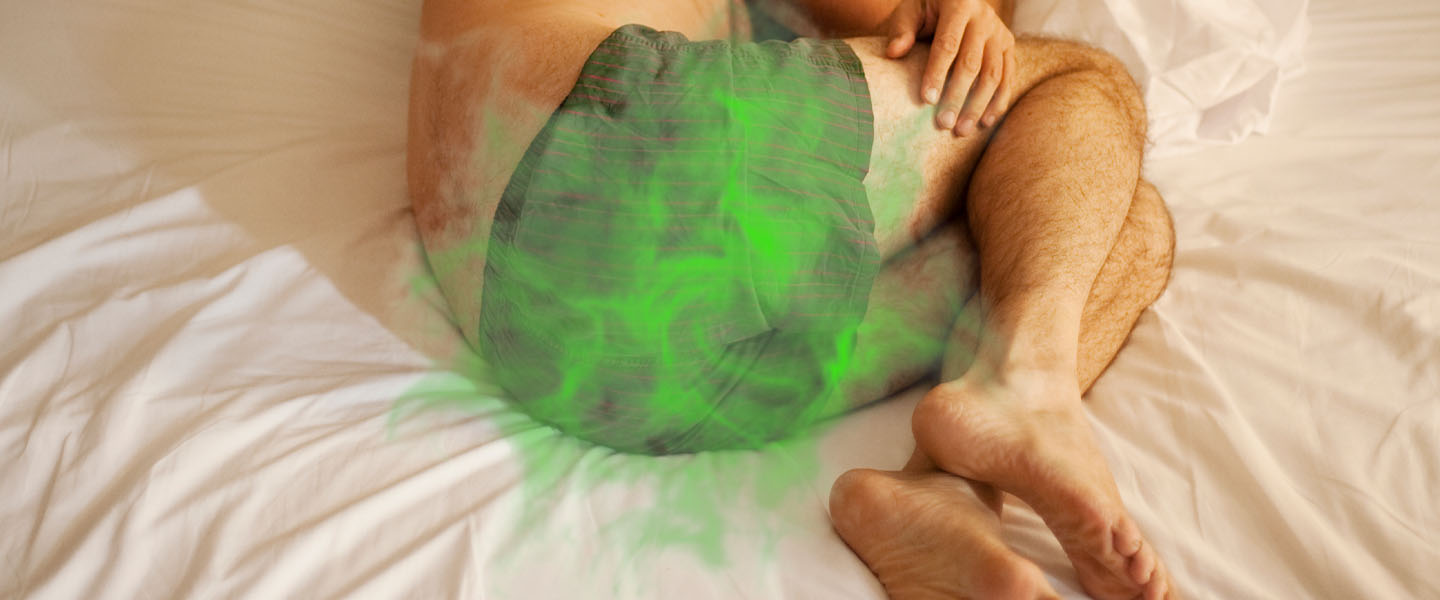

FAQs
Why Can’t I Burp Or Fart
Modified: September 23, 2023
Find answers to general questions like "Why can't I burp or fart?" and explore possible causes and solutions. Discover tips for better digestive health.
(Many of the links in this article redirect to a specific reviewed product. Your purchase of these products through affiliate links helps to generate commission for Under-tec.com, at no extra cost. Learn more)
Table of Contents
Introduction
Belching and farting are natural bodily functions that help to release excess gas from the digestive system. However, some people may experience a condition where they are unable to burp or fart. This can be both uncomfortable and embarrassing for individuals who are affected by it.
The inability to burp or fart can occur due to various reasons, including physiological factors, lifestyle choices, or underlying medical conditions. While it may seem like a minor inconvenience, the inability to release gas can lead to discomfort, bloating, and even pain in some cases.
In this article, we will explore the causes of the inability to burp, common symptoms, available treatment options, and the potential complications associated with this condition. It is important to note that if you are experiencing persistent or severe symptoms, it is always recommended to consult with a healthcare professional for a proper diagnosis and personalized treatment plan.
Understanding the reasons behind the inability to burp can help individuals with this condition find relief and improve their overall well-being. Whether you are personally affected by this issue or simply curious about it, read on to learn more about this interesting and often misunderstood aspect of human physiology.
Causes of Inability to Burp
The inability to burp can have various causes, ranging from lifestyle factors to underlying medical conditions. Here are some common reasons why individuals may experience difficulty in burping:
- Weak or dysfunctional esophageal sphincter: The esophageal sphincter is a muscular ring at the top of the stomach that helps regulate the flow of food and gas. If this sphincter is weak or dysfunctional, it may not open properly to allow burping, resulting in the inability to release gas.
- Reflux disease: Gastroesophageal reflux disease (GERD) can cause symptoms such as heartburn, acid reflux, and difficulty burping. The excessive presence of acid in the esophagus can irritate the muscles involved in burping, leading to difficulty or the inability to burp.
- Dysfunctional belch reflex: The belch reflex is the body’s natural response to the accumulation of gas in the stomach. In some cases, this reflex can become impaired, making it challenging to initiate a burp.
- Post-surgical complications: Certain surgical procedures, such as fundoplication (used to treat GERD) or laparoscopic Nissen fundoplication, can impact the ability to burp. This is because these surgeries alter the function of the esophageal sphincter and may restrict the release of gas.
- Anxiety and stress: Psychological factors, such as anxiety and stress, can affect the body in various ways, including digestion. When stressed, the body may produce excess gas, leading to bloating and discomfort. Additionally, anxiety can interfere with the relaxation of the esophageal sphincter, making it difficult to burp.
These are just a few examples of the potential causes behind the inability to burp. It is essential to consult with a healthcare professional for an accurate diagnosis, as they can evaluate your symptoms and medical history to determine the underlying cause of your specific condition. Identifying the cause is crucial for developing an appropriate treatment plan to alleviate your symptoms and improve your quality of life.
Symptoms of Inability to Burp
The inability to burp can be accompanied by a range of uncomfortable symptoms. These symptoms may vary in severity and can have a significant impact on an individual’s daily life. Here are some common symptoms experienced by individuals who are unable to burp:
- Bloating: Excessive gas trapped in the stomach and intestines can lead to bloating, causing the abdomen to feel swollen and distended. This can be both physically uncomfortable and aesthetically displeasing.
- Fullness: Individuals with an inability to burp often experience a sensation of fullness even after consuming a small amount of food or liquid. This feeling of fullness can persist for an extended period and may lead to a reduced appetite and difficulty maintaining a healthy diet.
- Discomfort or pain: The accumulation of gas and the inability to release it can cause discomfort or pain in the abdomen. This discomfort can range from mild annoyance to significant pain, which can be debilitating for some individuals.
- Heartburn: The inability to release gas can contribute to an increased likelihood of experiencing heartburn or acid reflux. The excess gas in the stomach can exert pressure on the lower esophageal sphincter, causing stomach acid to flow back into the esophagus and triggering a burning sensation in the chest.
- Regurgitation: In some cases, the inability to burp can result in regurgitation, where small amounts of undigested food or stomach contents flow back into the mouth. This can create an uncomfortable and unpleasant taste and may be accompanied by a sour or acidic sensation.
It is important to note that these symptoms can vary among individuals, and not everyone will experience all of them. If you are experiencing any of these symptoms consistently or if the symptoms worsen over time, it is advisable to consult with a healthcare professional for a proper diagnosis and treatment plan.
In the next sections, we will explore various treatment options available to manage the symptoms and improve the quality of life for individuals with an inability to burp.
Treatment Options
The treatment approach for individuals with an inability to burp depends on the underlying cause and the severity of the symptoms. Here are some treatment options that healthcare professionals may recommend:
- Dietary Changes: Making changes to your diet can help reduce symptoms associated with the inability to burp. Avoiding carbonated drinks, foods that cause gas buildup (such as beans and cruciferous vegetables), and eating smaller, more frequent meals can be beneficial. Keeping a food diary can help identify trigger foods and make it easier to manage symptoms.
- Exercises and Techniques: Certain exercises and techniques can help relieve gas buildup and improve the ability to burp. Practicing diaphragmatic breathing, performing gentle abdominal massages, and engaging in activities like yoga or walking can aid in the release of trapped gas. These techniques can help relax the muscles involved in the burping process.
- Medical Interventions: In some cases, medical interventions may be necessary. These can include prescribing medications to improve digestive function, such as prokinetic drugs that help move food through the digestive system more efficiently. If there is an underlying medical condition causing the inability to burp, such as GERD or a structural abnormality, surgical interventions may be considered.
- Burp Inducing Devices: Some individuals may find relief by using burp inducing devices, such as specialized straws or tubes, to manually release trapped gas from the stomach. These devices should be used under the guidance of a healthcare professional to ensure their safe and proper use.
- Counseling or Therapy: For individuals whose inability to burp is related to anxiety or stress, counseling or therapy may be beneficial. Stress-reducing techniques, relaxation exercises, and cognitive-behavioral therapy can help manage anxiety and improve overall well-being.
It is important to remember that the effectiveness of treatment options can vary from person to person. It is recommended to consult with a healthcare professional to determine the most suitable treatment plan based on your specific condition and medical history.
By addressing the underlying causes and implementing appropriate treatment measures, individuals with an inability to burp can often find relief and improve their quality of life.
Dietary Changes
Dietary changes play a crucial role in managing the symptoms associated with the inability to burp. Here are some recommendations for modifying your diet:
- Avoid Carbonated Drinks: Carbonated beverages, such as soda and sparkling water, can contribute to gas buildup in the stomach. Avoiding these drinks can help reduce bloating and discomfort.
- Limit Gas-Producing Foods: Some foods are known to produce more gas in the digestive system, such as beans, lentils, broccoli, cabbage, and onions. Limiting the consumption of these foods can help minimize gas buildup and alleviate symptoms.
- Eat Smaller, More Frequent Meals: Consuming smaller meals throughout the day instead of large and heavy meals can help reduce the amount of gas produced during digestion. It can also ease the strain on the digestive system and make it easier for the body to process food without excessive gas buildup.
- Chew Food Thoroughly: Taking the time to chew food thoroughly before swallowing can aid in the digestion process. Properly chewed food is easier for the body to break down, reducing the likelihood of gas formation and bloating.
- Keep a Food Diary: Keeping a food diary can help identify specific foods that trigger gas and other symptoms. Note down the foods you consume and monitor how you feel afterward. This can help identify patterns and make it easier to eliminate or reduce problematic foods from your diet.
- Stay Hydrated: Drinking plenty of water helps prevent constipation and keeps the digestive system functioning properly. Ensuring adequate hydration is essential for overall digestive health.
- Avoid Eating Too Quickly: Eating too quickly can cause you to swallow more air, leading to increased gas in the stomach. Eating at a slower pace and savoring each bite can help minimize gas buildup.
It’s important to note that individual responses to dietary changes can vary. It may be helpful to work with a registered dietitian or nutritionist who can provide personalized recommendations based on your specific needs and food preferences.
In addition to dietary changes, other lifestyle modifications, such as maintaining a healthy weight, regular exercise, and managing stress levels, can also support better digestion and minimize symptoms associated with the inability to burp.
Exercises and Techniques
Exercises and techniques can be effective in promoting the release of trapped gas and improving the ability to burp. Here are some exercises and techniques that may help:
- Diaphragmatic Breathing: Diaphragmatic breathing, also known as belly breathing, involves deep inhalation through the nose, allowing the diaphragm to expand, and exhaling through the mouth. This technique helps relax the diaphragm and can aid in releasing trapped gas.
- Abdominal Massages: Gently massaging the abdomen in a circular motion can help stimulate digestion and relieve gas buildup. Start at the lower right side of the abdomen and move clockwise, applying gentle pressure with your fingertips.
- Yoga and Stretching: Certain yoga poses and stretches can help improve digestion and relieve gas. Poses such as Child’s Pose, Wind-Relieving Pose, and Seated Forward Bend can help stretch and relax the abdomen, promoting the release of trapped gas.
- Walking or Light Exercise: Engaging in light physical activity, such as walking, can help stimulate movement in the digestive system. This can aid in the natural passing of gas and relieve bloating and discomfort.
- Gentle Hiccups: This technique involves sipping a carbonated beverage or swallowing air deliberately to induce gentle hiccups. The hiccup-like reflex can help release trapped gas and provide temporary relief.
It is important to note that these exercises and techniques may not work for everyone, and individual responses can vary. It’s recommended to consult with a healthcare professional or a qualified physical therapist before attempting any new exercises, especially if you have underlying medical conditions or are recovering from surgery.
Consistency and patience are key when incorporating exercises and techniques into your daily routine. Over time, these practices can help improve the coordination of the muscles involved in burping, making it easier to release trapped gas and alleviate symptoms associated with the inability to burp.
Medical Interventions
In some cases, medical interventions may be necessary to address the inability to burp and alleviate associated symptoms. These interventions are typically recommended when lifestyle changes, exercises, and dietary modifications have been ineffective. Here are some medical interventions that healthcare professionals may consider:
- Medications: Certain medications can help improve digestion and relieve symptoms associated with the inability to burp. For instance, prokinetic drugs can enhance the movement of food through the digestive system, reducing gas buildup. These medications should be prescribed and monitored by a healthcare professional to ensure their safe and appropriate use.
- Surgical Procedures: Surgical interventions may be considered in cases where there is an underlying condition that impairs the ability to burp, such as structural abnormalities or severe gastroesophageal reflux disease (GERD). Fundoplication, a surgical procedure that reinforces the lower esophageal sphincter, may be performed to improve burping ability and reduce reflux symptoms. These surgeries require careful evaluation and should be discussed with a healthcare professional.
- Botox Injections: Botox injections into the upper esophageal sphincter may be utilized in rare cases where the inability to burp is caused by tight or spasmodic muscles. Botox can help relax the muscles and restore proper burping function. However, the effects are temporary and may need to be repeated periodically.
- Endoscopic Procedures: In some instances, endoscopic procedures may be used to address structural abnormalities or strictures that hinder the ability to burp. These procedures involve inserting a flexible tube with a camera into the esophagus to diagnose and treat abnormalities.
It is important to consult with a healthcare professional who specializes in gastrointestinal disorders to determine the most appropriate medical intervention based on your specific condition and symptoms. They will evaluate your medical history, perform necessary tests, and guide you through the potential risks and benefits associated with each intervention.
Medical interventions should only be considered after other conservative treatments have been explored, and the decision should be made collaboratively between you and your healthcare provider.
Complications Associated with Inability to Burp
The inability to burp can lead to various complications and significant discomfort. Here are some potential complications that may arise:
- Bloating and Discomfort: The accumulation of excess gas in the digestive system can cause persistent bloating and discomfort. This can make everyday activities challenging and impact an individual’s quality of life.
- Pain and Pressure: The trapped gas can cause pain and pressure in the abdomen, leading to discomfort and distress. The severity of the pain can vary, ranging from mild to intense and affecting daily activities and overall well-being.
- Restricted Eating: The inability to burp may lead to a fear of consuming certain foods or having meals in social settings due to the discomfort and embarrassment associated with trapped gas. This can result in a limited and restrictive diet, potentially impacting nutrition and overall health.
- Difficulty Swallowing: In some cases, the inability to burp may be accompanied by difficulty swallowing, known as dysphagia. This can be caused by a dysfunction in the muscles involved in swallowing and can lead to choking or an increased risk of aspiration.
- Increased Reflux Symptoms: The inability to burp may exacerbate symptoms of gastroesophageal reflux disease (GERD), such as heartburn and regurgitation. The trapped gas can put additional pressure on the lower esophageal sphincter, leading to acid reflux and discomfort.
These complications can significantly impact the physical and emotional well-being of individuals experiencing the inability to burp. It is crucial to seek medical advice and explore appropriate treatment options to manage and alleviate these complications.
Managing the underlying cause of the inability to burp and implementing lifestyle changes, exercises, dietary modifications, and potentially medical interventions can help reduce or mitigate the complications associated with this condition.
Conclusion
The inability to burp can be a frustrating and uncomfortable condition that affects many individuals. While it may seem like a minor inconvenience, the symptoms can have a significant impact on daily life and overall well-being. However, there are various treatment options available to manage and alleviate the symptoms associated with the inability to burp.
Understanding the causes, symptoms, and available interventions is key to finding relief. Lifestyle changes, such as dietary modifications and implementing exercises and techniques, can often provide relief and improve burping ability. In some cases, medical interventions may be necessary, including medications or surgical procedures to address underlying issues.
It is essential to consult with a healthcare professional for a proper diagnosis and personalized treatment plan. They can evaluate your specific condition, consider any underlying medical conditions, and guide you towards the most appropriate interventions.
While the inability to burp can be challenging, with proper management and support, individuals can find relief and improve their quality of life. The key is to be proactive, seek help when needed, and be open to exploring different treatment options.
Remember, everyone’s journey with the inability to burp is unique, and what works for one person may not work for another. Patience and persistence are crucial as you navigate the various treatment options available. Stay in close communication with your healthcare provider, share your experiences, and work together to find the most effective approach for managing your specific condition.










